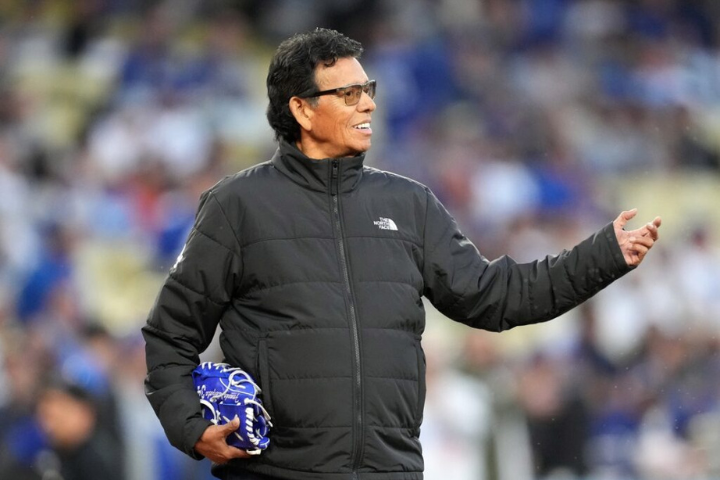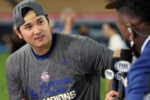The Los Angeles Dodgers’ Mexican-born star Fernando Valenzuela, who won the 1981 NL Cy Young Award and Rookie of the Year and sparked “Fernandomania,” has passed away.
He was sixty-three. He passed on Tuesday night at a hospital in Los Angeles, according to the team, although they did not specify the cause or any other information.
Valenzuela was one of the most dominant players of his era
His passing occurs just before the Dodgers take on the New York Yankees at home on Friday night to begin the World Series. Valenzuela will get recognition at the Dodger Stadium series, according to Baseball Commissioner Rob Manfred. In September, Valenzuela abruptly quit his position as a color commentator for the Dodgers’ Spanish-language television show.
Earlier this month, he was reportedly admitted to the hospital. He continued to be a frequent at Dodger Stadium because of his profession, where he presided over the press box dining area prior to games and was still well-liked by the fans who came to him for pictures and signatures.
Despite never being nominated to the Baseball Hall of Fame, Valenzuela was a very popular personality in the 1980s and one of the most dominant players of his time. He is, nevertheless, a part of Cooperstown, which has a number of artifacts, such as a signed ball from his 1990 no-hitter.
Stan Kasten, team president and CEO said “He is one of the most influential Dodgers ever and belongs on the Mount Rushmore of franchise heroes, He galvanized the fan base with the Fernandomania season of 1981 and has remained close to our hearts ever since, not only as a player but also as a broadcaster. He has left us all too soon.”
As the youngest of twelve children in Mexico, Valenzuela’s ascent to fame and prominence in the Latino community of Los Angeles, as well as his achievements on the pitch, helped draw new Major League Baseball fans. Even when he retired, they remained fond of him for years.
Manfred said “He consistently supported the growth of the game through the World Baseball Classic and at MLB events across his home country, As a member of the Dodger broadcasting team for more than 20 years, Fernando helped to reach a new generation of fans and cultivate their love of the game. Fernando will always remain a beloved figure in Dodger history and a special source of pride for the millions of Latino fans he inspired.”
Valenzuela became the Dodgers’ opening day starter as a rookie
When Jerry Reuss was hurt 24 hours before he was supposed to start in 1981, Valenzuela was named the Dodgers’ rookie opening day starter. He started the season 8-0 with five shutouts and an ERA of 0.50, including a 2-0 shutout against the Houston Astros.
He was the only player to win both Rookie of the Year and Cy Young in the same season. Among Dodgers supporters, his performances sparked a frenzy known as “Fernandomania.” He would warm up on the mound while listening to the ABBA hit song “Fernando.” In his first season, which was cut short by a players’ strike, he was 13-7 with a 2.48 ERA.
From 1981 to 1986, when he recorded 97 wins, 84 complete games, 1,258 strikeouts, and a 2.97 ERA, Valenzuela was selected to the All-Star team each year. He made eight postseason starts and finished 5-1 with a 2.00 ERA. He won a Gold Glove and two Silver Slugger Awards.
One of the highlights of Valenzuela’s career was his no-hitter on June 29, 1990, in a 6-0 victory over the St. Louis Cardinals at Dodger Stadium. He walked three and struck out seven.
The fans called Valenzuela “El Toro” because of his unusual and distinctive pitching motion, which involved staring up at the top of each windup.
He was one of the few pitchers of his day who routinely threw the screwball, which was part of his repertoire. When the Dodgers thought Valenzuela, who wasn’t known for being a hard thrower, needed another pitch, teammate Bobby Castillo taught him.
Valenzuela was let off by the squad shortly before the 1991 campaign began. In addition, he pitched for the St. Louis Cardinals, San Diego Padres, Philadelphia Phillies, Baltimore Orioles, and the California Angels.
After 11 seasons with the Dodgers, he was 141-116 with a 3.31 ERA before retiring in 1997. In 17 seasons, he was 173-153 overall with a 3.54 ERA.





GIPHY App Key not set. Please check settings